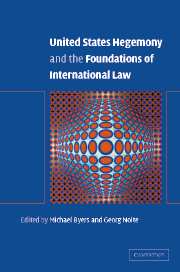Book contents
- Frontmatter
- Contents
- List of contributors
- Preface
- Introduction: the complexities of foundational change
- PART I International community
- PART II Sovereign equality
- PART III Use of force
- 7 The use of force by the United States after the end of the Cold War, and its impact on international law
- 8 Bending the law, breaking it, or developing it? The United States and the humanitarian use of force in the post–Cold War era
- 9 Comments on chapters 7 and 8
- PART IV Customary international law
- PART V Law of treaties
- PART VI Compliance
- Conclusion
- Index
9 - Comments on chapters 7 and 8
Published online by Cambridge University Press: 13 July 2009
- Frontmatter
- Contents
- List of contributors
- Preface
- Introduction: the complexities of foundational change
- PART I International community
- PART II Sovereign equality
- PART III Use of force
- 7 The use of force by the United States after the end of the Cold War, and its impact on international law
- 8 Bending the law, breaking it, or developing it? The United States and the humanitarian use of force in the post–Cold War era
- 9 Comments on chapters 7 and 8
- PART IV Customary international law
- PART V Law of treaties
- PART VI Compliance
- Conclusion
- Index
Summary
Thomas Franck
In this comment, I deal first with the chapter written by Brad Roth, before responding to the general argument raised by Marcelo Kohen.
I agree with some of Roth's conclusions, if not always his tone and nuance. I do think that he is basically right about policy-oriented jurisprudence as advocated by the New Haven School, but two elements of the New Haven thesis seem to me to be irrefutable in this context, or at least to have been unrefuted either by legal logic or by recent events in Kosovo and elsewhere. Since disclosure is the name of the game I wish to disclose that I am not now and have never been a Yalie. I am surprised to find that I am a moral positivist, but then, this is reminiscent of the man who was surprised to find that he had been speaking prose all his life. The jurisprudential problem to which the New Haven School addresses itself is the international equivalent of the United States v. Holmes case or its British equivalent, in which passengers in an overloaded lifeboat were thrown overboard by crew members in order to prevent its sinking in stormy seas. What the New Haven School contributes to the disposition of the murder charge that was actually brought against the survivors of this incident is a rational search for a way in which the law might seek to avoid self-destructive reductio ad absurdum.
- Type
- Chapter
- Information
- United States Hegemony and the Foundations of International Law , pp. 264 - 284Publisher: Cambridge University PressPrint publication year: 2003

